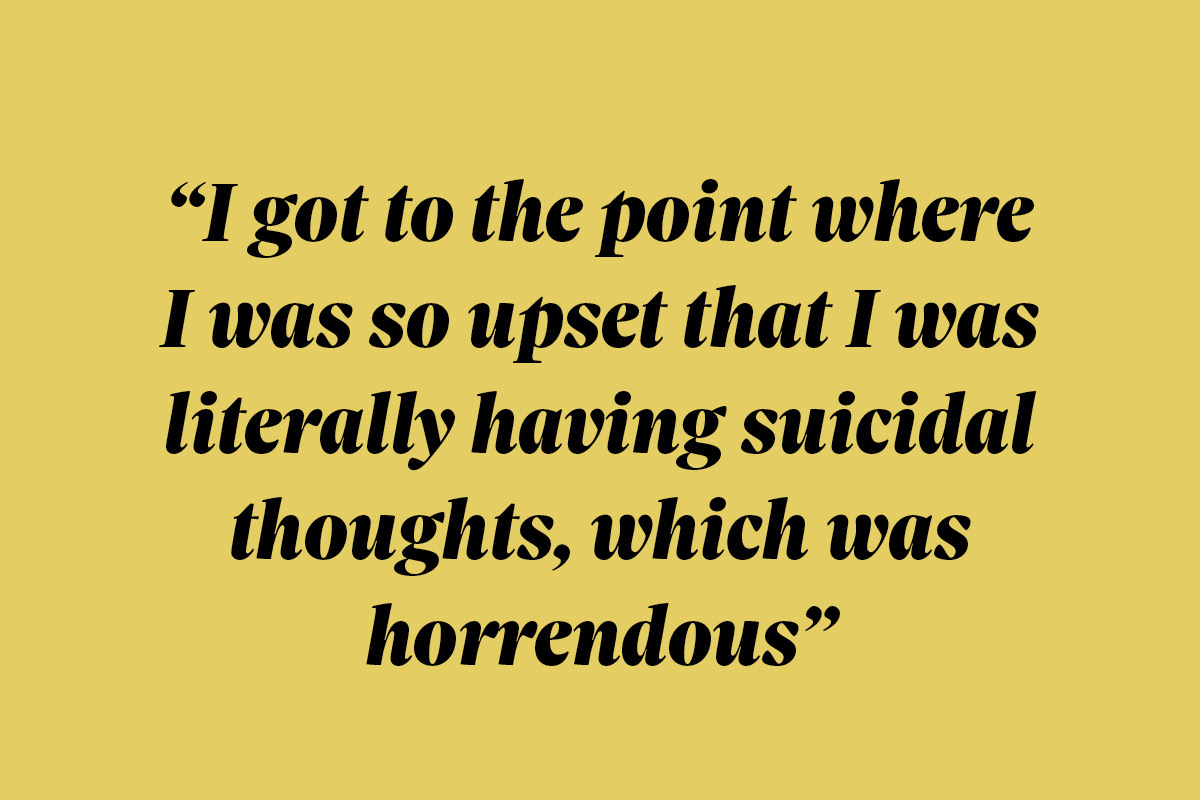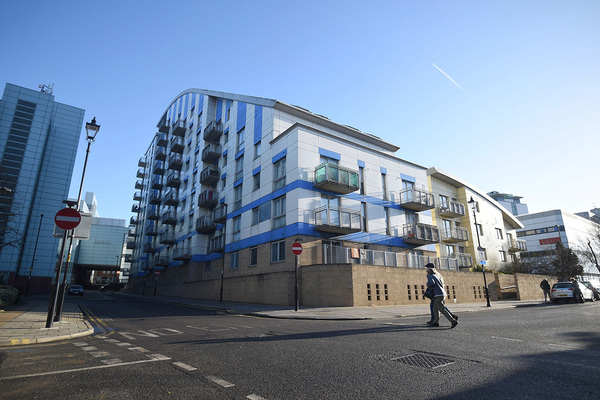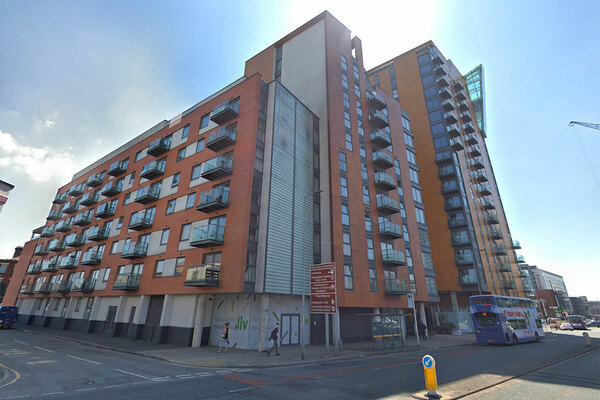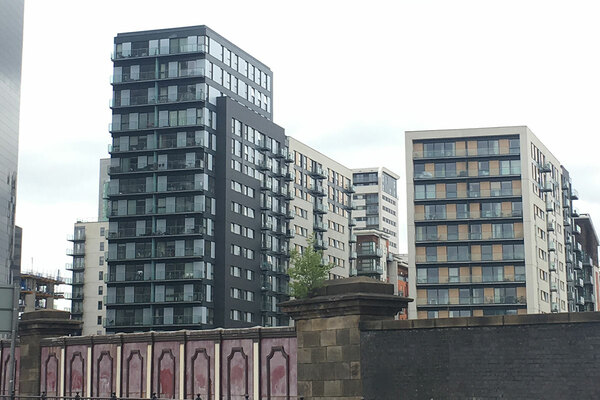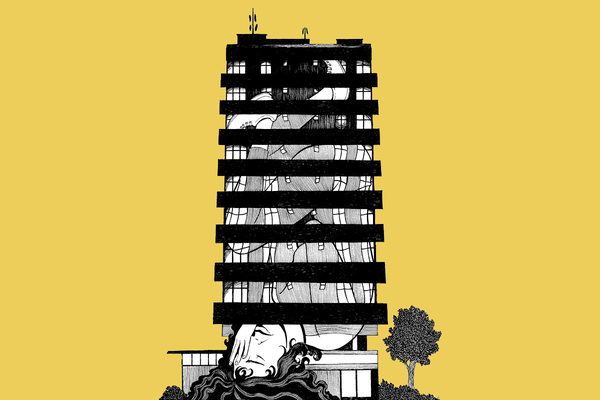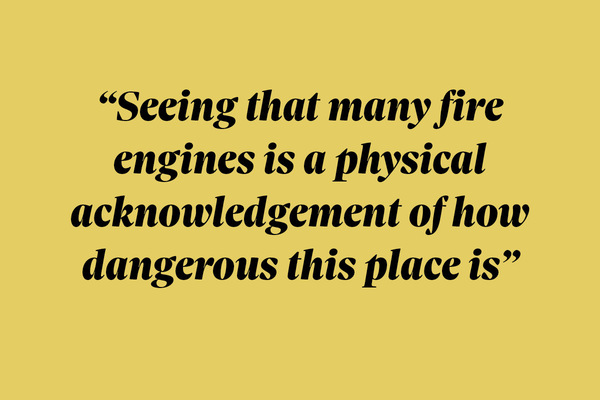Four stories that show the mental trauma cladding scandal victims are facing
Jack Simpson talks to four leaseholders about the trauma of living in a home that they know is unsafe because of its dangerous cladding
The leaseholder who turned to self-harm
It was 2008 when Alice (not her real name) bought her shared ownership flat at L&Q’s Stratford Eye Estate.
For a number of years, she was happy with her east London home.
“That was until a few months [ago] when I made the decision to sell my flat,” she explains. “I made the decision to try and find a quieter life and move out of London.”
That decision came after a period of turbulence for Alice.
She suffers from a condition similar to arthritis, which effects her joints and bones, leaving her in pain and requiring regular hospital check-ups.
Last year, she also had to undergo a large operation to remove a non-cancerous tumour. At the time, Alice was also dealing with the death of her father.
However, when she started the process of selling her home she quickly realised there were issues with her block.
The valuer told her that she had a balcony that had wooden panels and, under the new government guidance around combustible materials, this would mean she would struggle to sell the home.
It is a similar story for thousands of leaseholders living in residential blocks across the country. Government guidance states that combustible materials must be removed from all blocks regardless of height if deemed dangerous.
“I got to the point where I was so upset that I was literally having suicidal thoughts, which was horrendous”
This has caused turmoil in the mortgage market, with banks unwilling to lend money to buyers until they can prove that the cladding on the building is safe. To do this, dangerous cladding must either be removed, costing thousands, or a building inspector must deem the building safe and issue an EWS 1 form.
With thousands of buildings across the country needing these checks, and a major shortage of inspectors, leaseholders are facing long waits.
Alice has been told by L&Q that it could take years before the situation is fixed, due to the volume of buildings they have to check and remediate.
She says she feels trapped and finds concerns about her safety and her future filling her thoughts. It is the first thing she thinks about when she wakes up every morning, she tells Inside Housing.
“What has happened is horrific. I was really looking forward to moving on with my life, reducing stress which would help my health, and what has happened is the exact opposite.”
The situation has had a hugely negative impact on her mental health, too.
“I got to the point where I was so upset that I was literally having suicidal thoughts, which was horrendous,” she says with her voice slightly breaking.
The pressure had got so intense that Alice turned to self-harm at one point. It was the first time she had ever taken this step.
“Thankfully I have stopped now, but for me to get to that point shows you how much the scandal has brought me to breaking point,” she adds.
An L&Q spokesperson said: “We apologise that we haven’t been able to provide our residents at Stratford Eye with the information their mortgage provider is requesting and we are sorry to hear of the impact this process has had on the resident’s mental health.
“The health and safety of our residents is our number one priority.
“This is a complex situation, which is affecting thousands of people across England, and we completely understand how frustrating it is.
“We are trying to get the information that lenders are asking for but this is taking time because of recent changes to the government’s building safety advice.
“We want to do everything we can to support leaseholders affected by this issue.”
The retired widow
“I can’t sleep in a flat knowing a fire could break out at any time,” says Karen (not her real name).
“Being on the sixth floor and a retiree I don’t know if I could get out in time, I’m scared all of the time.”
Karen lives in a block in central Manchester which was found to have dangerous cladding and a number of other fire safety defects in 2018.
She says that, since then, the situation has taken an enormous toll on her mental health.
She is retired and a widow.
“I feel my heart race with an irregular rhythm and know I have to manage my stress but how can I when I’m a prisoner of this situation 24/7 with no let up?”
Karen’s husband died 16 years ago after battling a long-term degenerative disease. She cared for him through the illness. Her mother died in the same year.
She says her mental health was better at the time of her bereavements than it is now.
“At night I toss and turn worrying, I feel my heart race with an irregular rhythm and know I have to manage my stress but how can I when I’m a prisoner of this situation 24/7 with no let up?” she says. She has now temporarily moved in with her daughter because of these safety concerns.
Despite not working and having a very modest income, she like the other leaseholders in her block, are contributing to an £18,000 a month waking watch bill for the block. The bill to remove the cladding and other fire safety issues, which could be a five-figure sum, also hangs over them.
This is not the first time she has taken a financial hit for something that wasn’t her fault. Karen was born in the early 1950s and was one of the thousands of women of that age who lost out on six years of her pension due to the government raising the retirement age for women from 60 to 65 in the mid 1990s – one of the so-called WASPI women.
She says that both experiences have contributed to a feeling of hopelessness.
They have also deeply affected her relationships with family and friends, with some avoiding her due to her wanting to discuss the situation she is in.
“I find myself feeling very isolated and alone. A couple of my family members are avoiding me and tell me they feel sorry for me,” she explains.
“I just don’t want to talk to any of them any more. I feel pain from being dismissed, having no voice, no control and feeling unprotected.
“I want to run away and leave it all behind.”
The leaseholder who fears he will relapse into depression
After more than seven years out of work suffering from severe depression, Ian (not his real name) was starting to put his life back together.
A series of catastrophic life events meant he had descended into what he describes as a “really dark place”.
He lost his job and would not return to work.
"After a lot of hard work my life took a very positive turn, and then because of the cladding situation I was back to square one"
After years of working closely with his doctor, and after a couple of years doing volunteer work, he built up enough experience and confidence to return to full-time work.
Now able to go out with friends again and spend time doing what he enjoyed, he was in a good place.
Then he was told that the building in which he lived had dangerous cladding and the old feelings quickly reappeared.
“It was a quick fall to be honest – after a lot of hard work my life took a very positive turn, and then because of the cladding situation I was back to square one,” he tells Inside Housing.
Ian was diagnosed with persistent depressive disorder, a chronic form of depression, when he was 23. The condition can often lead to feelings of hopelessness but can be managed through medication.
However, there are triggers that can bring about more severe bouts of depression which can affect other parts of your life.
“The cladding situation sent me into a spin. I had some late attendances because I wasn’t sleeping well and my boss let me take some time off work because of my mental health,” he says.
Ian, like many leaseholders, is already paying huge costs for interim fire safety measures.
“We’ve just had a bill for a new fire safety system. I’ve had to devastate my savings by settling a £1,000 bill,” he says.
However, it is the larger remediation bill, thought to be £20,000 per flat, that Ian is most worried about. Despite not earning much, he is trying to save £300 a month to go towards paying the bill when it finally arrives.
“I’m currently living a very church mouse lifestyle,” he says. “I’m trying to save as much money as possible, I’m not eating well and I have a fractionally better quality life than I did when I was unemployed.”
With all of these stresses and worries, Ian’s biggest fear is that his depression returns and stops him from working.
“I am dreading going back to that state to be honest, there is a significant dread that I could find myself there all over again,” he says.
The PTSD sufferer
“We were sitting at home watching Netflix and we could hear a faint sound, so faint that I couldn’t tell whether it was part of the show we were watching,” says Rob Burberry, a leaseholder at the Eastgate development, a nine-storey block in Woking with flammable expanded polystyrene insulation.
It was not until the scene changed on the programme he and his wife were watching that they realised what they could hear was the block’s fire alarm.
“My wife and I knew we had to get out because we knew what this building is made of, knowing that the place is flammable,” he says, remembering the incident on 20 April this year.
The couple rushed out of their sixth-floor flat. By the time they got to the fourth floor they were hit by a strong smell of smoke and they could hear the sirens outside. Mr Burberry describes the staircase as pandemonium, with neighbours, including parents carrying kids, trying to escape.
“When you put it all together, the 999 call, the smell, seeing parents carrying their children and not knowing what we are going down to, it was absolutely terrifying,” he says.
Mr Burberry suffers from post-traumatic stress disorder (PTSD) after being caught in a terrorist incident in Strasbourg less than 18 months earlier.
He was locked in a restaurant for six hours as gunmen fired on civilians in the French city in December 2018, an attack that left five people dead.
Fortunately, the Surrey Fire and Rescue Service quickly put out the fire in April after sending six fire engines. The hundred evacuated residents could return to their flats that night.
“When you put it all together, the 999 call, the smell, seeing parents carrying their children and not knowing what we are going down to, it was absolutely terrifying”
For Mr Burberry, it has served as a terrifying reminder of the dangers with his building.
“Seeing that many fire engines is a physical acknowledgement of how dangerous this place is,” he says.
It has also triggered his PTSD. He says he finds himself dwelling on the terrorist attack since the fire scare.
“The way my condition works is that I am thinking more about the terrorist incident in Strasbourg, and now I have a second frame of reference of that incident,” he explains. “I have found myself thinking a lot more about Strasbourg since the fire.”
The COVID-19 lockdown hasn’t helped his mental health either. Mr Burberry is asthmatic, meaning he is more vulnerable than others and so has limited his trips outside of the home.
“Now I find myself more aware that I am trapped in a flammable property and powerless to do anything,” he says.
“I sit on my balcony in the sunshine, which would be nice in a non-flammable block, but I am sitting there thinking how flammable the block is.”
Suzanne Horsley, director of building safety at Southern Housing Group, said: “The safety and well-being of our residents is our foremost priority. While we cannot comment on the individual circumstances of any of our residents, we can confirm that we take mental health issues very seriously.
“We recognise that concerns around fire safety can trigger anxiety and other mental health episodes. We work hard to reassure our residents that, where cladding issues have been identified, we have put in place additional fire safety measures.
“These are there to provide peace of mind as well as to ensure that people can feel safe in their homes. As a matter of policy we will always work with our residents and support them if they have any specific concerns about how their home is affecting their health.”
